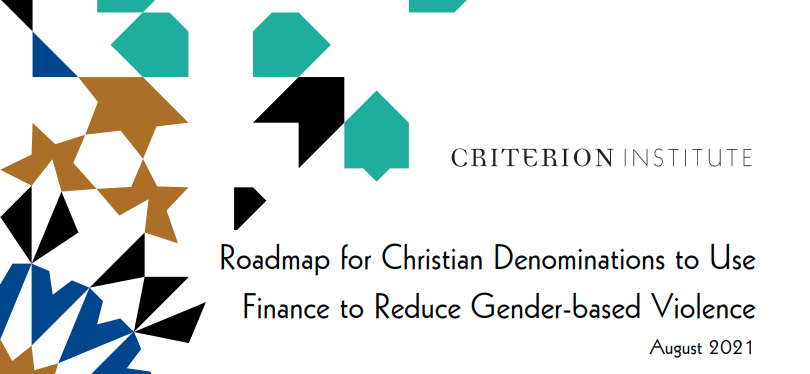Today is Women’s Equality Day, a day that commemorates the ratification of the 19th Amendment to the U.S. Constitution, granting women the right to vote. Earlier this week, I circulated a request to SGI members asking them to sign an investor letter to a company that requires employees to submit to forced arbitration in matters of workplace discrimination, harassment, and other worker complaints. As these employment agreements disproportionately have adverse effects for women and People of Color, we are asking the company if the use of forced arbitration is consistent with their commitment towards gender and racial equity.
In some respects, supporting an investor letter of that nature is consistent with our mission and automatic for SGI, so I appreciated a recent invitation to be a part of the Criterion Institute’s design sessions for a Roadmap for Christian Denominations to Use Finance to Reduce Gender-based Violence. This allowed for some greater reflection on why we take these actions and what we hope to achieve.
While I recommend that you read the Roadmap for yourself, I’d like to make three observations.
First, the document begins with “Sparking the financial imagination,” a fruitful origin that I experienced in the design sessions, embedded in an exercise with our hands that we performed as we began. A theologian from Duke Divinity School, Craig Dykstra, coined the term “pastoral imagination.” As he put it, in any profession (law, architecture, music, etc.), those particularly apt in its practice see things that most of us will miss. Dykstra also writes of ecclesial imagination: “the way of seeing and being that emerges when a community of faith, together as a community, comes increasingly to share the knowledge of God and to live a way of abundant life–not only in church but also in the many contexts in which they live their daily lives.” This roadmap aims to spark that imagination “in the many contexts in which [we] live [our] daily lives.”
Second, the roadmap address “prophetic hope.” A Biblical prophet is not one who sees the future so much as one who sees clearly what is happening here and now. A lesson in community organizing is about seeing with two eyes: one eye sees “the world as it is,” and the other sees “the world as it should be, as God made it to be.” A prophetic hope, then, is a stubborn conviction that we can live into that second world, in spite of the immediate evidence to the contrary. It took many years for women to obtain the right to vote, and obtaining the goal of eliminating gender-based violence appears to be on a distant horizon. We, as faith-based investors are called to practice this prophetic hope.
Third, I am a Catholic; so please, then, let me leverage a little Catholic guilt in a final observation about “bystanders.” Many conversations about violence typically frame the discussion in terms of “victim” and “perpetrator.” While that conversation is important, it only addresses part of the problem. A comprehensive response to gender-based violence must also address the role of collective passivity in the face of anything that dehumanizes. Given the pervasiveness of inaction, whether in the form of denial, willful ignorance, or silent complicity, we who are bystanders must be held accountable, especially those of us who occupy social positions of privilege. We can’t afford to stay on the sidelines.
I am reminded of when I heard a member of an African-American church who helped drive a bus to integrate some schools in the Boston area. Like the kids, he faced insults and potential violence regularly. When he was asked: why did you do it? He replied, “Well, I think you’re either working to make the world a better place, or you’re working to keep it the same. So I had to drive the bus.”
I hope that all of us feel similarly compelled to act, engaging all of the imagination and hope that we can muster!

